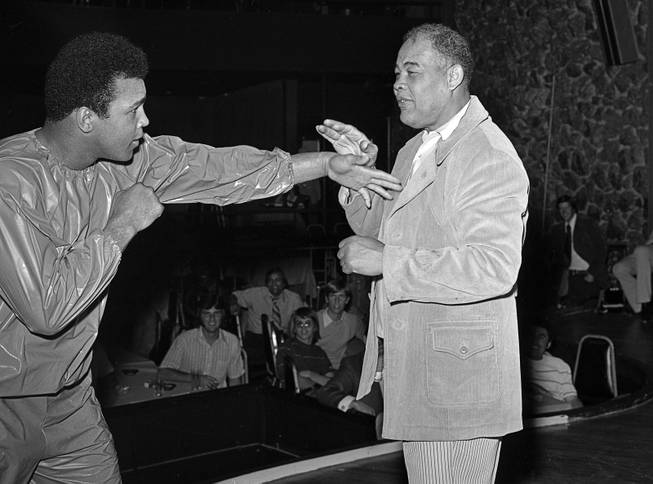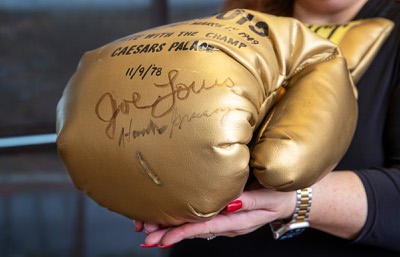
Las Vegas News Bureau
Muhammad Ali jokes with boxing legend Joe Louis during a workout at Caesars Palace in Las Vegas Thursday, Feb. 1, 1973. CREDIT: Tony King/Las Vegas News Bureau.
Sunday, Feb. 11, 2024 | 2 a.m.
Las Vegas, the entertainment capital of the world, is famous for putting on world class events.
There was one event, however, which might have been the largest ever gathering of A-list entertainers and celebrities, which had no pre-event publicity and wasn’t televised. And with no news coverage, it has been largely forgotten. The event was called: “A Night with the Champ — A Tribute to Joe Louis” and hosted at Caesars Palace on Nov. 9, 1978.
I had been working for about a year at Caesars Palace, where my father was the president. Joe was still working at Caesars, but he was in bad health.
The program
“A Night with the Champ — A Tribute to Joe Louis” on Nov. 9, 1978, at Caesars Palace was a star-studded event featuring A-listers serving in various roles to keep the night moving along the script.
Masters of ceremonies: Frank Sinatra, Howard Cosell
Invocation: Rev. Jesse Jackson
National anthem: Robert Merrill
Performers (center stage): Frank Sinatra, Wayne Newton, Dean Martin, Paul Anka, Tom Jones, Sammy Cahn, Billy Daniels
Performers (lectern): Milton Berle, Rich Little, Joey Bishop, Slappy White, Jack Carter, Redd Foxx, Jackie Gayle, Red Buttons
The attendees: Taking part in “A Night with the Champ — A Tribute to Joe Louis” on Nov. 9, 1978, were celebrity performers, religious leaders, sports stars and political dignitaries. Among them were:
Boxing: Muhammed Ali, Billy Conn, Leon Spinks, Sugar Ray Robinson, Max Schmeling, Ken Norton, Lou Nova, Larry Holmes, Tony Galento, Charlie Fusari, Floyd Patterson, Ingemar Johansson, Don King, Martha Louis
Golf: Doug Sanders
Baseball: Tommy Lasorda, Tommy John, Steve Garvey, Charlie Hough, Reggie Smith, Roger Maris, Rod Carew, Reggie Jackson, Jim Rice, Joe Torre, Willie Mays, Ernie Banks, Bill Russell
Football: Jim Brown, Deacon Jones, George Allen, Rosie Grier, Darrell Royal, Joe Namath
Tennis: Jimmy Connors, Don Budge, Rod Laver
Entertainment: Gregory Peck, Telly Savalas, Orson Welles, Valerie Harper, Gene Kelly, Jon Voight, Jack Klugman, Kristy McNichols, Connie Stevens, Cary Grant, Robert Conrad, Mike Douglas, Clint Eastwood, Alice Cooper, Norman Lear
Political dignitaries: Gov. Mike O’Callahan, Lt. Gov. Robert Rose, Sen. Howard Cannon, D-Nev., Los Angeles Mayor Tom Bradley, Detroit Mayor Coleman Young, Louisiana Gov. Edwin Edwards, U.S. Army Gen. Clifford Alexander
The years of absorbing punches coupled with a heart attack and a stroke had left him in a wheelchair, unable to care for himself. Joe’s wife, Martha, was caring for several children they had adopted.
They had nowhere near enough money to pay all the bills. It was decided at a board meeting we could not let this family drift into poverty, so we came up with a plan to form a foundation — The Joe Louis International Sports Foundation — to take care of them.
To fund the foundation, we would put on an event, something Caesars Palace was good at doing. To my amazement, I was tasked with figuring out what to do and executing it with a goal of raising $500,000.
To add to my stress, Joe was failing. Anything we did had to be done quickly. It was also determined that Caesars Palace would absorb all the expenses of the event so that every dollar collected would go to the foundation.
I met with Cliff Perlman, our CEO, who was enthusiastic about the idea. We batted around a few ideas, talked to our entertainment and PR people, and came up with the idea to have a tribute dinner for Joe. Tickets were to be sold for $1,000, no comps. To the best of our knowledge there had never been an event where tickets were $1,000, certainly not in Las Vegas. We had never even charged $100 for our previous events.
Then, I got very lucky. I got put in touch with Johnny Francis, who put together the Friars Club Roasts. The Friars Club was an eating club whose membership was primarily entertainers, made famous for its hilarious televised roasts. Johnny knew every celebrity worth knowing, and they would talk to him. I called him and told him what we had in mind — not a roast but a tribute. He got so excited, he could hardly talk. Joe was his hero, too.
We also decided that no one would get paid for appearing, and Caesars would provide room and food at no charge.
We agreed that the event would never be shown for commercial purposes because it would not be right for Caesars Palace to profit off a potential television special. Though the event was taped, it could not be monetized.
The tape sits in a closet or box somewhere in the bowels of Caesars Palace, like the Ark at the end of “Raiders of the Lost Ark.” Johnny did his thing, the celebrities were anxious to participate and to everyone’s surprise asked for nothing more than we offered.
I was still looking for something special to cap off the event. That was when I learned about Big Fights Inc. This company, owned by Jimmy Jacobs and Bill Cayton (who later managed Mike Tyson), owned the film rights to almost every prize fight there had ever been. I called them and explained what we were doing. They urged me to come to New York to show me what they could do.
They told me they had films of Joe from when he was a kid fighting Golden Gloves, family films, training films no one had ever seen and more. We decided a four- or five-minute film would be good, and they said, “Don’t worry, it’ll be fantastic.” I then asked with great trepidation what that would cost and they said, “Nothing. Give us each a ticket to the event and we’ll be happy.” Joe was their hero, too.
The last piece of the puzzle was selling tickets at $1,000 apiece. We had room for 50 tables of 10 to reach our original goal of $500,000. We sent invitations to our best customers and others we knew who liked the fights.
We held our collective breath. We couldn’t announce the celebrities because we were still putting names together. This event had to sell on Joe’s name and Caesars’ reputation. It went down to the wire, but we sold out.
The event was black tie. Women were in gowns. I couldn’t believe who came to the celebrity cocktail party before the event. They had all shown up. Because Jimmy and Bill brought the film with them, I had never seen it and I was very nervous about that. The room was set up with a three-tier dais to hold the celebrities, a center stage and the Caesars Palace orchestra.
Johnny Francis made a few brief opening remarks thanking everyone for coming, the invocation was given, the national anthem was sung and then the film shown.
The first three or four minutes were of Joe in never-before-seen footage. We could see him as he grew up and polished his boxing skills with the orchestra playing the Gillette “Friday Night Fights” theme music in the background. The last minute was nothing but knockout punches, one after another. It was breathtaking.
At the end, the room went pitch black, the orchestra began to play the theme from “Rocky” and a pinpoint spotlight centered on one of the double doors into the room. As the doors opened, the light grew bigger and in came Joe, his wheelchair being pushed by Frank Sinatra. Everyone was on their feet screaming and applauding. There wasn’t a dry eye in the house. To be honest, the rest of the night is a blur for me.
The evening was a big success in every way. Joe and Martha had enough money to take care of them. Any money left over was to be used for scholarships and children’s charities. Everyone had a great time. The Caesars Palace casino had a good weekend.
We had all witnessed something special. I sat on the dais between Cary Grant and Gen. Clifford Alexander, the first Black secretary of the U.S. Army. They both told me nothing could have kept them from coming to the event when they heard about it. That was generally the feeling in the room.
Joe Louis’ boxing record was wonderful, but there have been other fighters whose records were great, too. That begs the question: what was so special about Joe? Timing, certainly.
Boxing was one of the major sports then, followed by millions. The iconic pair of fights with Max Schmeling come to mind. Joe got knocked out in the 11th round of the first one, but then, in the face of Hitler’s bragging about Aryan superiority, Joe knocked out Schmeling in the first round of the rematch. That cemented his position as an American hero.
His demeanor in the ring was always stoic. His opponents were dispatched with efficiency, usually early in the fight. He was always a gentleman, complimenting his opponents whether he won or lost. Joe joined the Army when WWII started. He toured constantly, visiting the soldiers, fighting exhibitions, usually donating the purse to the war effort. He visited the wounded in hospitals wherever he went.
That was a practice he continued well after the war as long as he was physically able. He spent a lot of time visiting children’s wards as well. They didn’t know who he was, but they could feel he was someone special. Joe was far from perfect. His problems were well-documented, but those problems probably made him more relatable. Joe captured the hearts of generations of Americans.
The notables who attended the benefit were all there because they wanted to help Joe. He was their hero.

